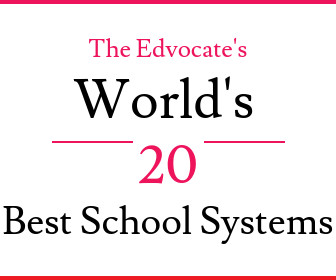The Edvocate’s List of the 20 Best Education Systems in the World

*The Edvocate is pleased to produce its “Best of the Best” resource lists. These lists provide our readers with rankings for education-related blogs, twitter accounts, influencers, products, etc. These lists are meant to be fluid, and for that reason, they are regularly updated to provide up to the moment information.*
This list is particularly tricky because not only is best a relative term, it depends on a number of different aspects. For example, you have to look at how students perform both in school and after graduation, how competitive the students are, the different subjects that are taught, overall merits, and academic level, to name just a few of the points to consider. This article attempts to rank schools based on overall performance, with the mention of school systems that excel in a particular area. The list is based on geographical location, not any particular rank.
As one of the leaders in numerous fields, it is no surprise that Japan has an exceptional educational system. In l world rankings they are in the top for science, math, and literacy for all grade levels. Even though students do not have to attend high school, Japan has an enrollment rate of nearly 98%.
Ministry of Education, Culture, Sports, Science, and Technology – +81-(0)3-5253-4111 (Reception)
Education is taken incredibly seriously in South Korea, sometimes sending children to school seven days a week. As a result, the literacy rate is nearly 98%, and the country continues to rank high in science and math assessments. Often vying for the top spot in education with Japan, the focus is on learning over student satisfaction.
Ministry of Education – [email protected]
Because it has been under European influence for so long, Hong Kong is one of the few Asian schools that follow a European model (specifically the UK). Despite teaching in two primary languages (Cantonese and English), the literacy rate is nearly 95%. They also have a high rate of bilingual students as a result of the dual language use in schools.
Education Bureau – [email protected]
There is no question that Singapore performs very well when compared to other school systems around the world. Students are expected to continue to push the boundaries so that they can overtake the top ranked spot usually held by either Japan or South Korea. However, it has been faulted for placing too much pressure on students too soon.
Ministry of Education – [email protected]
Students begin school at 5 years old and continue until they are 19, but education is only required for students between ages 6 and 16. Ranked 7th in the world for science and literacy and 13th for math, New Zealand spends a considerable sum on the education of its students. There are two primary languages as well, Maori and English.
Ministry of Education – [email protected]
With a literacy rate of nearly 99%, Australia enjoys very favorable rankings compared with other countries. While it does not place in the top 10, the country has a 75% secondary graduation rate, and more than a third of the population has completed post-secondary schooling. In terms of the three key areas, Australia ranks 6th (reading), 7th (science), and 9th (math).
Department of Education, Employment, and Workplace Relations – Contact info not readily available.
Not only are the students of the Netherlands competitive in all three key areas (math, science, and literacy), they are usually among the happiest. That’s because the Netherlands focuses on improving the mind and the students’ wellbeing. With less homework in primary school than most countries, students endure less pressure and stress so that school is something they get acclimated to, making it a more positive early experience.
Ministry of Education, Culture, and Science – online contact form
Finland consistently ranks high in terms of overall accomplishments and student satisfaction. Students are not separated based on their intelligence or abilities, meaning there are no advanced or remedial classes. As a result, there is a far smaller gap between the strong and weak students than in nearly any other country.
Ministry of Education and Culture – [email protected]
Spending nearly 4% of the country’s GDP on education, Estonia has a slightly different take on what education should be. In 1992, the country passed the Education Act with the explicit goal of creating “favorable conditions for the development of personality, family and the Estonian nation…” It also seeks to ensure the development of minorities within its borders. Schools are treated not only as a way to educate children in reading, math, and science; they are a way of making students better Estonian citizens.
Ministry of Education and Research – [email protected]
The UK has an internationally famous school system, from the beginning grades to some of the most prestigious universities in the world (Oxford and Cambridge). However, each country controls their own school system (Wales, England, Scotland, and North Ireland). Despite the divided approach, each of the countries manages to help put the UK near the top of the international rankings annually. If you look at the different systems within the UK, Scotland tends to have an edge in international competitiveness.
Department for Education – online contact form
The Danish school structure is complex, going from pre-school through higher education, with five different types of secondary schooling. Students can choose the education that best suits their chosen career path, or they can opt out of secondary school. Considering the fact that secondary schooling is not a requirement, it is incredibly impressive that Denmark has an enrollment rate of 82%. This speaks highly of the education system that students choose to stay in school.
Danish Ministry of Education – [email protected]
There is a close tie between education and business in Poland because the Ministry of Education is also the head of business. The country has been ranked as having the fourth best school system in Europe, an area known for being highly competitive when it comes to education. It has a tiered secondary school system (like several other European schools) so that students can focus on their primary areas of interest for their future career.
Ministry of National Education – [email protected]
Germany takes education very seriously, which is why it often ranks near the top of school system assessments. All schooling is managed by the state governments (not the federal). The country also takes a different approach to mandatory schooling; the first year (Kindergarten) is not required, but completion of secondary schooling is. Secondary schooling is tiered with five different types. Post-secondary schooling is also among some of the best in the world in terms of science and innovation, and many international students seek a degree from German universities.
Federal Ministry of Education and Research – [email protected]
While primary school is set up as it is in many other countries, secondary school is completely different. Once students reach an age when their talents have been established, they can enroll in one of four types of secondary schools: general, technical, vocational, and art. Education is considered a critical aspect of preparing children to be productive and satisfied citizens. That is also why students are able to go to school for free (or nearly free if they go to a private school).
Ministry of Education and Special Needs – online form
The vast majority (95%) of students attend public schools, and they get many of the lessons that are taught more often in private schools in other countries. There are three major languages in the country (German, French, and Italian), and students from the different regions of the country are taught based on the main language used in that region. Students attend different secondary schools based on their strengths and desired profession.
Federal Department of Economic Affairs, Education, and Research – [email protected]
Unlike many of the schools on this list, Ireland has a large percentage of privately run secondary schools (although they are funded by the government). The school is free from beginning to end (including higher education).
Department of Education and Skills – email contact list
Qatar has been growing its education without a lot of the fanfare and news coverage seen in other nations. Instead, the country has focused on innovating and developing a grassroots approach to ensuring literacy for all citizens. To ensure that it continues to develop and innovate, the country has implemented a Vision 2030 Program. The school is free for all citizens.
Ministry of Education and Higher Education – online form
With an impressive literacy rate of nearly 100%, Israel is a small country that manages to make education a high priority. Both Hebrew and Arabic are used in the classroom, depending on the area of the country. Their education system includes primary, middle, and secondary schooling. In 2012, Israel was called the world’s second most educated country.
Ministry of Education – contact list
A small country in the Caribbean, Barbados actually invests heavily in the education of its students. With one of the highest literacy rates in the world (98%), education is a top priority and is run by the government.
Ministry of Education, Science, Technology and Innovation – [email protected]
Both English and French are used in school in Canada, based on the province. The country has one of the highest literacy ratings (just over 99%). It also has the highest number of college graduates of any country in the world.
Council of Ministers of Education – mailing list
Conclusion
Education is something that every nation manages in its own way, but there are some countries that are far more efficient than the rest. Exceptional education is not restricted to large countries or even to those countries that are well known for their educational systems. Some of the top 20 education systems are actually in very small countries where governments are able to place an emphasis on education. Ultimately, the best school systems are those that understand how best to reach their students, highlighting the best in their own cultures, instead of focusing solely on international competitiveness.





